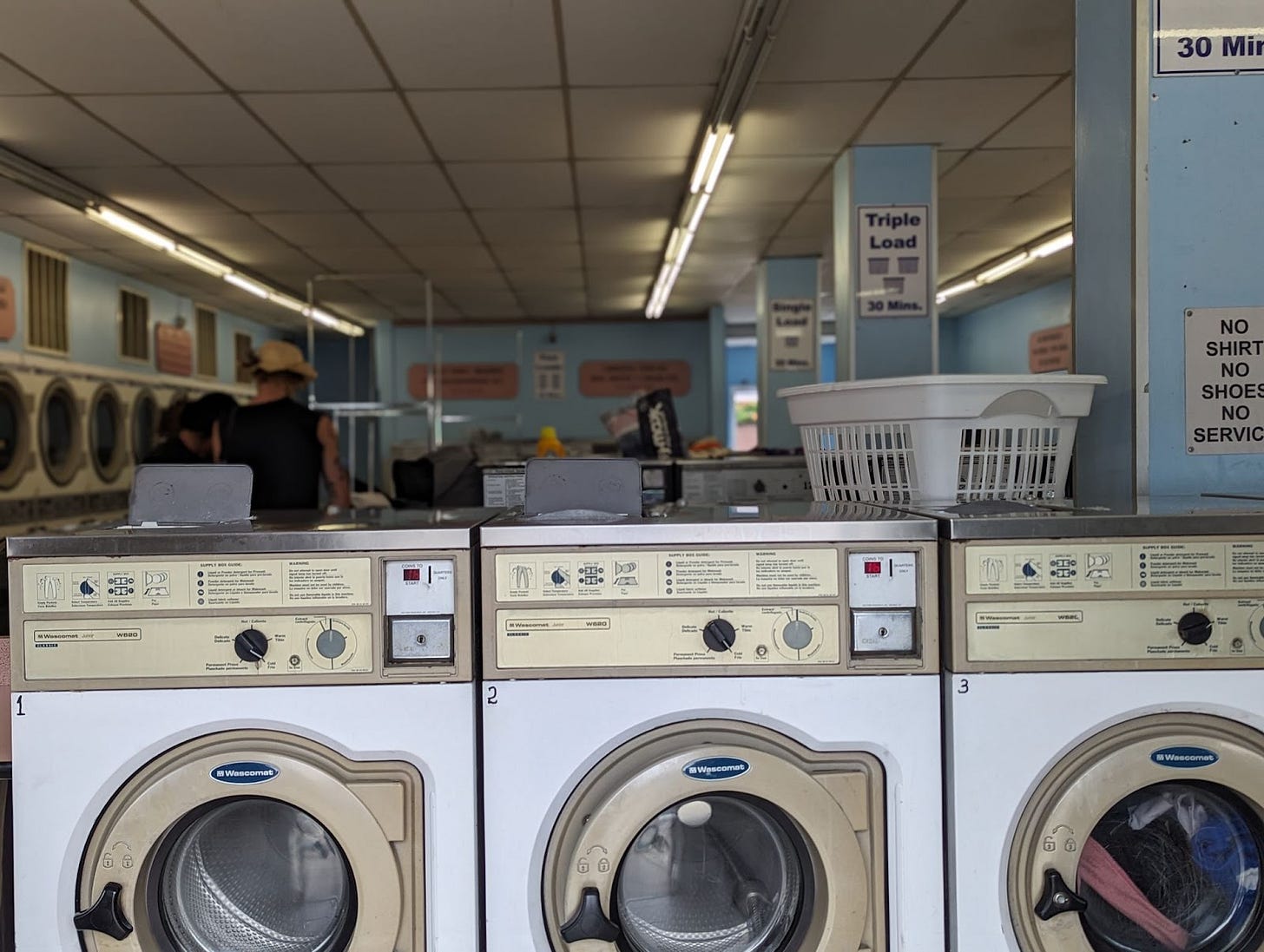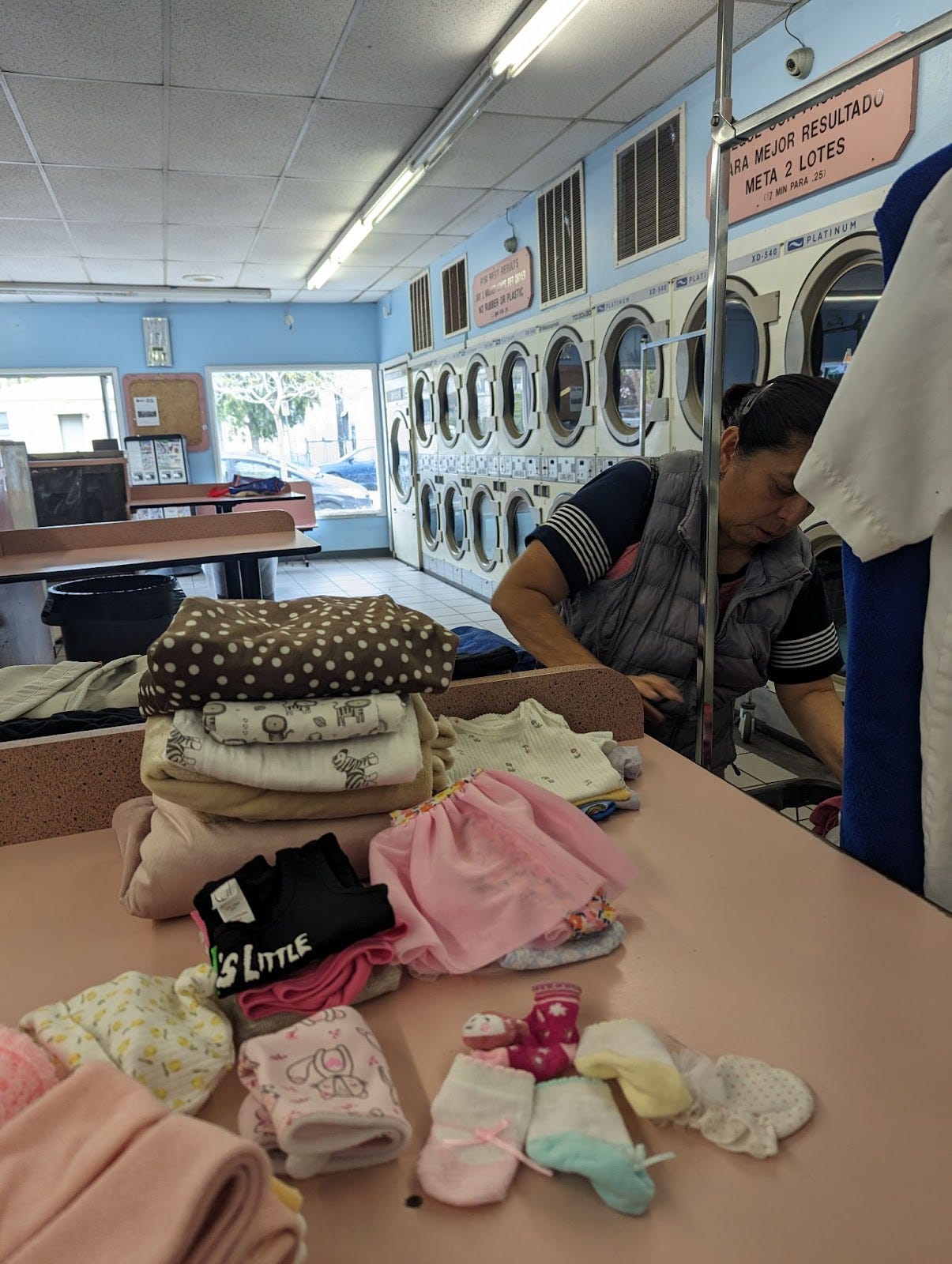The Last Laundromat by Venice Beach
Five decades of service now face uncertainty under "Silicon" rebranding
Today’s dispatch comes from Areli Morales Lopez, a bi-national, Zapotec, multilingual freelance multimedia journalist, community documentarian, and cultural worker who grew up in Venice, CA and now lives in Oaxaca, Mexico. She covers the Oaxacan diaspora, Zapotec and colonial history, migration, and environmental effects.
On any given day on the corner of 4th and Rose Ave in Venice Beach, a buzz of Spanish, Zapotec, Portuguese, Mandarin, and English can be heard by the patrons of the gathering point behind a pink facade called Rosebud Drycleaners & Launderette. This family-operated, coin laundromat with video games, washing machines, dryers, dry cleaning, and fluff & fold service has served the once working-class community for five decades. Washing a small load, which can hold up to nearly double the load of a household washer, costs $4, while drying is $1. But the mainstay’s days are numbered; the building is up for sale and the family who has operated the laundromat for the last two decades can’t afford to buy it since the area surrounding it has been gentrified. The now trendy street which the laundromat sits on is almost unrecognizable from the Rose Avenue I grew up on.
Steps away from the beach, Rose Avenue went from multi-family bungalows, liquor stores, carnicerias and bakeries to luxury condos, trend-setting boutiques and restaurants. The Rose bungalow courts my family first called home in the 1980s are now high-end homes. The buttery croissants of the Pioneer bakery my mother bribed us to attend church with are now condos and Gratitude Cafe, a vegan cafe. The Rosebud laundromat and La Isla Bonita food truck, which is known for its mariscos and carne asada tortas, both opened in 1987 and seem to be the last of the old Rose Avenue.
Affordable, coin-operated laundry services no longer seem to be a need for the new wealthy residents of what they now call Silicon Beach. Sitting only a block away from Google's offices, it's hard not to see this last remaining service providing a third space as a fading gem, a relic of a Venice community washed away. Lifetime residents of our mostly Black and migrant, formerly redlined and lower-income community once called the Ghetto by the Sea, still depend on this walking distance utility, which our older apartments do not have.
People of all walks of life and income brackets still rely on this place, some looking for a warm space to dry their clothes, others a refuge from the harsh elements, some housed, some not. Some are migrants learning the language and looking for services who are excited to share with loved ones the washing machine luxuries they don't have back home.
Growing up, on Saturdays and Sundays the streets were full of people pushing carts packed with clothes ready to wash in preparation for the week ahead. We would wheel our dirty school and work clothes to one of the three laundromats that once existed within a one-mile radius. My family frequented the laundromat on Lincoln and Vernon. In between cycles, my mom and I would wander the aisles of the Fox swap meet on Lincoln Blvd, where I bought my first cassette tape, a compilation of Selena’s hits. On the days my dad could drive us, we would go a few blocks further to the coin-wash on Lincoln and Rose, Venice Beach Wash Coin Laundry, where the colorful murals on the wall told the story of our eclectic beach, and where K-Earth 101 played on the speakers, harmonizing with the electric hum of the washing machines. It was here that I learned to love oldies and classic rock.
Both places closed in the 2000s to make room for the multiple dollar sign restaurants, the expansion of Whole Foods; just like Wurstkuche replaced the Latin Dance Hall Leonardos and the way that new Rose Avenue cafes, bars and restaurants replaced our bakeries and bungalow homes; the dry clean-only and pick-up laundry services are financially out of reach for the many of us who still live in the rent-controlled pockets. Migrants, service workers, and houseless neighbors don't seem to have a place in Venice anymore.
These laundromats are the third spaces where we share updates and catch up with friends and neighborhood gossip. They are a safe space where, at a reasonable price, folks can stay clean for school and work. When this space closes, where will people who don’t have access to washing machines or a car go, those struggling to stay on their feet and keep clean? Moreover, what will Venice be without us?










This laundromat tells the larger story of a shifting community and the resilience of those who have managed to stay amid gentrification. Thank you for the stories and memory keeping 💕💕
Thank you for sharing! I remember growing up in Hollywood and going to the laundromat with my parents on Friday nights, playing on the arcade games 👾 (Bubble Bobble was my favorite) or doing my homework. And they had a little store inside the laundromat, selling the basics like detergent but also candy and toys for the kids.